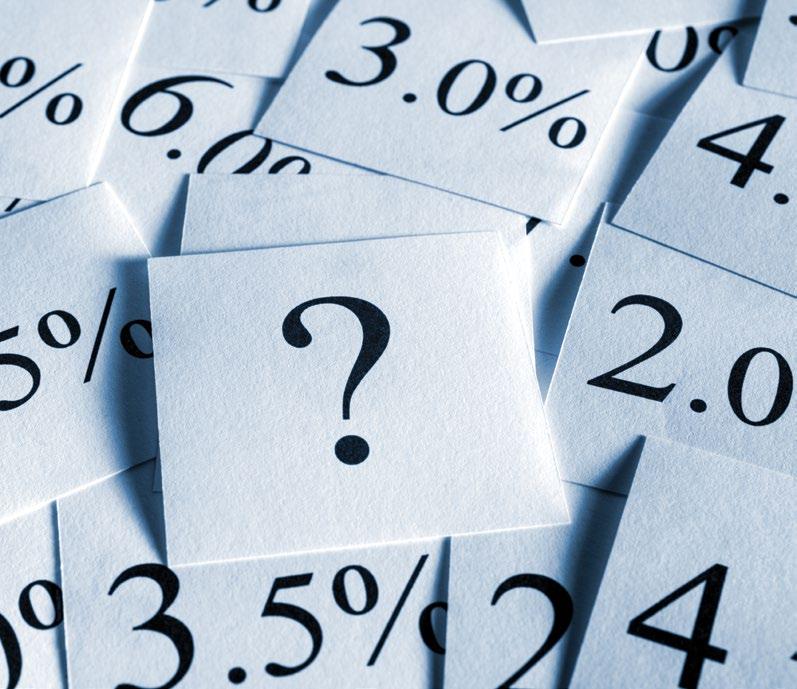
5 minute read
INFLATION OUTLOOK
The question is not whether the but MPC will cut interest rates –by how much? By Dr Adrian Saville
A sharp fall in the rate of consumer price inflation has defanged what was initially paraded as ‘aggressive’ monetary policy action intended to stimulate the floundering economy. Given a muted inflation outlook, and the depressed economic setting, the question is not if the South Africa’s Reserve Bank’s Monetary Policy Committee (MPC) will cut interest rates, but rather by how much?
In January, the MPC cut the repo rate by 25 basis points (bps) in response to the domestic economic recession of the second half of 2019, a backdrop of a subdued outlook for consumer price inflation and an anaemic growth forecast.
Since January, and in direct response to the impact of COVID-19 on the economy and financial markets, the MPC has announced three further interest rate cuts, for a cumulative total of 2.75% this year.
However, ahead of the last MPC meeting in May, the inflation outlook – which is the primary consideration in the SARB’s decision framework – remained subdued and, if anything, faced a risk of falling through the bottom of the 3-6% inflation target.
In fact, this risk has since transpired, as South Africa’s inflation rate has fallen to 2.1% in May from 4.5% in January this year. Notably, this 2.1% inflation marks a 15-year low and is also below already-muted expectations.
Meanwhile, the SARB's MPC 2.75% repo rate cut makes for a real rate cut of just 0.35% (2.75% interest rate decline less 2.40% inflation rate decline). In other words, the sharp drop in inflation has essentially mitigated the impact of interest rate cuts.
Subdued inflation outlook
Numerous factors at work mean that our inflation expectations remain muted, such as: • The recent strengthening in the rand, which has since climbed to R16.60/$ from
R17.60/$ at the time of May’s MPC • Extended economic weakness and • An oil price that has dropped to $42/bbl from $60/bbl at the start of 2020.
As a consequence, consumer price inflation is likely to hug the bottom of the SARB’s 3-6% tunnel, and to end the year at 3.3%. Seen together with the current bleak economic setting, the consensus view is that the MPC will announce a further rate cut.
Some analysts are pointing to the possibility of a cut as deep as 50ps (0.5%) on top of the 275bps (2.75%) already seen so far in 2020. However, South Africa’s Forward Rate Agreement (FRA) curve is pricing in 35bps, which can be interpreted
Dr Adrian Saville, Chief Executive, Cannon Asset Managers

as a 100% likelihood of a 25bp cut, and a lower probability of a 50bp cut. Additionally, a Reuters’ poll of analysts expects the SARB to cut rates by 25bps to 3.50% from the current 3.75%.
Overall then, the SARB is likely to cut 25bp this week, with a small risk of a 50bp move.
Additional key market focal points
Alongside the announcement on interest rates, the market is likely to pay careful attention to updates on the SARB’s expectations for economic growth and consumer price inflation.
In the last MPC statement, the SARB noted that gross domestic product (GDP) was expected to contract by 7.0% in 2020, compared to the 6.1% contraction forecast in April. Whilst this would represent the deepest economic contraction that we have on record, the SARB’s estimate remains light compared to private sector forecasts that point to a contraction in double-digit territory. In sympathy, we would not be surprised to see a further downward revision to the SARB’s economic growth outlook.
At April’s emergency meeting, the SARB’s forecast for consumer price inflation stood at 3.6% for 2020, rising modestly to 4.5% for next year. In May these figures were revised downward to 3.4% and 4.4% respectively. We expect the SARB to lower their inflation forecast again in the July MPC statement.
As an aside, it is worth noting that the domestic interest rate curve is among the steepest in the world. The 10-year bond yield is 9.3%, which is 5.5% above the central bank rate. By comparison, the United States’ 10-year government bond has a 0.59% yield which is just 34bps above the Fed rate of 0.25%. Read this way, this suggests significant market scepticism about the durability of SARB’s easing. However, we are of the view that the muted inflation outlook and depressed economic setting means that monetary policy is likely to remain well-anchored for the foreseeable future.
If anything, the growth-and-inflation cocktail supports further interest rate easing over the second half of 2020, with potentially as much as a further 50bps in easing.
A member of the Bidvest Financial Services Group, Cannon Asset Managers has built a reputation for results since the company’s founding in 1998. We are true investors, seeking out the best investment opportunities across all asset classes locally and internationally. Through our rigorous research process, we look to buy the right assets at the right prices, rising above speculative thinking, with the knowledge that a sound philosophy, patience and resilience are rewarded.
Cannon Assets
T +27 (0)11 407 3530/3533 W www.cannonassets.co.za
Disclaimer
The contents of this article do not consider the individual needs or circumstances of any person, and do not constitute investment advice. While all opinions expressed herein are based upon our research and all information is accurate to the best of our knowledge, Cannon Asset Managers does not accept any liability whatsoever for any loss arising from reliance on this article. Individuals seeking to invest should first consult a professional financial advisor before taking any decisions. Cannon Asset Managers’ is committed to fairness and integrity in all investment activities and attempts to align the interests of its investment team with clients. Consequently, members of the investment team may have a personal interest in the shares or portfolios mentioned within this article. Cannon Asset Managers Proprietary Limited (registration number 2000/025176/07) is licensed as a financial services provider in terms of the Financial Advisory and Intermediary Services Act, 2002.










